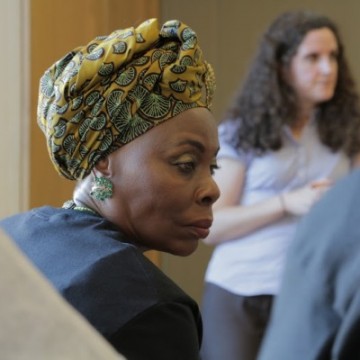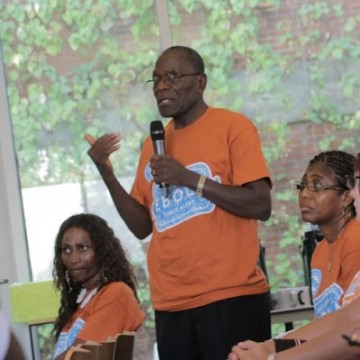Ebola Takes Toll on Portland’s West Africans
Friday, November 07, 2014
Photo credit: Kate Willson
There have been as many as seven deaths from Ebola among the relatives of one Portland family, while others have had entire households wiped out, said Nathaniel Kerkulah, the chairman of the Oregon Association for Liberia in Portland.
“We are hearing the bad news of our people dying all the time, of a family who lost their mom, or two parents,” Kerkulah said. “We are afraid when the phone is going to ring and we are going to get the bad news.”
However, many can only assume their loved ones have died. Kerkulah said Ebola victims in Liberia are quarantined in large clinics and are cremated after death. With as many as 150 deaths per day, some Portland families do not know if their loved ones are dead or alive, only that there is no news. Kerkulah said he’s never heard of someone surviving an Ebola clinic.
The Ebola virus, also known as Ebola hemorrhagic fever, has similar symptoms of the flu, but grows to include severe vomiting, diarrhea, and unexplained hemorrhaging that can last up to 21 days, according to the CDC.
Over 2,400 people have died from Ebola in Liberia with 6,535 total confirmed cases, according to the Center for Disease Control. At the center of the epidemic in Liberia, Guinea, and Sierra Leone, there have been 4,941 deaths and 13,540 confirmed cases.
West African Among Us
The African immigrant and refugee population in Multnomah County has been growing over the last few decades. There were a total of 1,218 immigrants and refugees in the area in 1990. Twenty one years later, that had number grown to a community of 11,703 people spread out over east Portland, Gresham, Beaverton, and Hillsboro explained Koffi Dessou, the equity training and education program coordinator for the City of Portland.
Many West African immigrants came to the U.S. fleeing brutal civil wars and are still traumatized from the experience, said Dr. Amy Sullivan, manager of County Health Department of Communicable Diseases.
The Ebola outbreak and fear for friends and family on the ground adds another layer of trauma.
Liberia is still rebuilding after its own civil war. When the Ebola outbreak hit it overwhelmed the already tenuous medical care system. Kerkulah’s niece in Liberia told him of a young girl who was turned away from a hospital while suffering from an asthma attack. The hospital would not help her because she had not been tested for Ebola, yet did not have the resources to do testing. The girl died from asthma as a result, Kerkulah said.
Trouble at Home
However, problems in Africa are not the only things weighing on the minds of many immigrants.
As Ebola cases become more common in the U.S. fear of the disease has crept into everyday life even in Portland. Portland recently tested a patient for Ebola at Providence Milwaukie Hospital, but there have been no confirmed cases in Oregon.
West Africans often feel stigmatized by irrational fears many Portlanders have, Kerkulah said.
Liberian immigrant Joseph Yeaney felt what it’s like to be confronted by someone’s irrational fears first hand.
Yeaney was wearing a T-shirt that said “Liberians together, Ebola stands no chance” when he entered a Portland 7-Eleven recently.An employee saw the T-shirt and started running away, waving his hands and saying, “Go away, you have Ebola,” Yeaney said. Yeaney managed to calm him down, but as he left the man told him, “We don’t want Ebola in America.”
It's confrontations like that, compounded by fear and anxiety about family back in Africa, that are taking their toll on many in Portland.
“We’ve been here for all these years and now people are avoiding contact and asking questions that show they don’t know much about the truth of Ebola,” Kerkulah said. “It’s psychological. It’s so much for our people.”
Members of the African immigrant community speaking at an awareness event for Ebola. Photo credit: Kate Willson
“Regardless of your country, if you're black and you speak with an accent you are already stigmatized,” Dessou said.
The stigmatism is enough to make some people, even younger children, consider moving back to Africa because they feel unwanted here, Dessou said.
African community leaders have been working with the Multnomah County Health Department and city officials to help end negative Ebola reactions and misconceptions.
“Fear is our biggest enemy,” said Sullivan. “We need to treat each other respectfully. People have to understand how Ebola spreads so they aren’t running away from someone in a grocery line who has been here for 10 years.”
Kerkulah said recent reports from Liberia show signs the spread of Ebola is reducing, but he knows the road to recovery for his homeland will be a long one. He thinks the Liberian government needs to start traveling around the country, seeing what has been affected and what has worked in handling the disease. However, he also said the U.S. and African immigrant community must continue to support the population as they rebuild after Ebola.
“In the aftermath, what’s going to happen is family members, orphans, and widows are going to be looking up to us,” Kerkulah said. “We are all in this together.”






Follow us on Pinterest Google + Facebook Twitter See It Read It